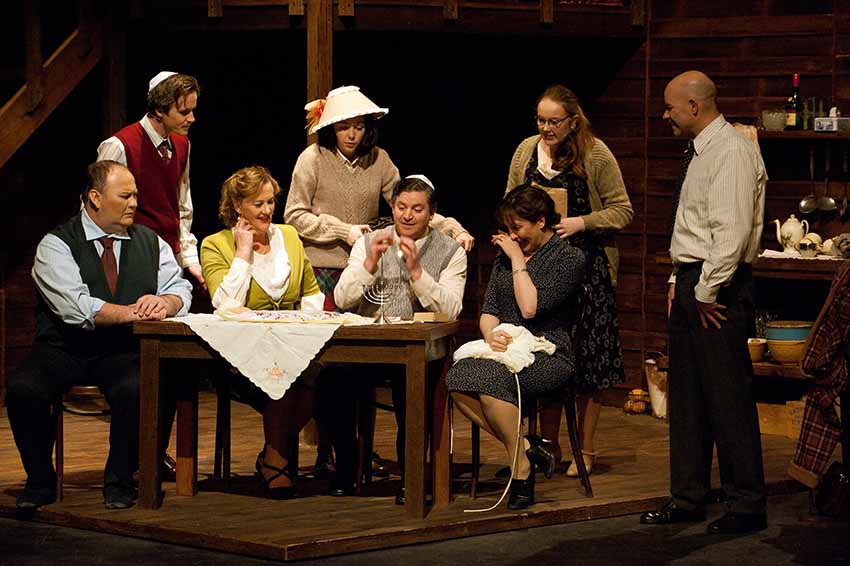Director Josh Gardiner leaves us no place in hide in his production of The Diary of Anne Frank.
By Gill Heal
JOSH Gardiner is up for a challenge. Director of the Wonthaggi Theatre group’s recent The Diary of Anne Frank, he tells us the play was not intended to entertain. “Ideally,” he says, “I want to make you think and question.” A graduate of the Victorian College of the Arts, 23 years old, he’s saying he wants us to make this story our own, to leave the theatre as different people.
Does he not know the history of theatre is littered with such hope? For audiences who, at the play’s end, will be found transfixed in their seats, awash with emotion, not bolting for the exit to catch the 10.15 tram?
There are reasons why theatre doesn’t change lives. It’s not just that we’re passive observers of actors pretending to be someone in another person’s story. We’ve got our own story and it’s different. Made complacent by privilege, cushioned from war or hunger, by our right not to be assaulted, bullied, offended even, how can we presume to understand what it’s like to be Anne Frank? It’s as though we come from a different planet.
We might feel sympathy, yes, but sympathy comes from outside the drama. The problem’s not ours; it’s theirs. It’s feeling pity from a safe position, in the stalls.
But this production aimed higher. Complacency was never an option for the audience. In the opening moments, discordant music runs uneasily behind familiar images of Nazi tyranny. Through the basic business of the play – “the little dramas of confined living” – we witness a series of utterly familiar human encounters driven by greed, fear, vanity; by kindness and the desire to live a principled life. All the time, their nerves stretched taut, strung through with hope and dread. Our stories are different but the raw material that generates those stories is the same. They are us, our tribe.
At regular intervals Nazi officers circle in the darkness, chilling, inexorable. It’s us they circle.
Finally comes news of the Allied invasion. The tension momentarily eases; the air is tranquil, sunny with hope. And at that precise moment of utter unpreparedness, the Nazis crash through. The little group huddles, frozen with fear. Someone breaks away, runs a few steps, runs back, blind with terror, like a bird netted in a tree. And then they are gone and the room is shockingly empty.
Change can happen rapidly or incrementally or not at all. It requires new insight: a deeper understanding of ourselves and others and the things that connect us. Conditions achievable in the theatre of a small country town, it seems, as much as the great theatres of the world.
The Wonthaggi Theatre Group’s Diary of Anne Frank was outstanding in many ways. Here are two. It made systematic choices about how to tell an old story with clarity and integrity. It gave us a deeper understanding of the precariousness of life and the potential of human goodness.
JOSH Gardiner is up for a challenge. Director of the Wonthaggi Theatre group’s recent The Diary of Anne Frank, he tells us the play was not intended to entertain. “Ideally,” he says, “I want to make you think and question.” A graduate of the Victorian College of the Arts, 23 years old, he’s saying he wants us to make this story our own, to leave the theatre as different people.
Does he not know the history of theatre is littered with such hope? For audiences who, at the play’s end, will be found transfixed in their seats, awash with emotion, not bolting for the exit to catch the 10.15 tram?
There are reasons why theatre doesn’t change lives. It’s not just that we’re passive observers of actors pretending to be someone in another person’s story. We’ve got our own story and it’s different. Made complacent by privilege, cushioned from war or hunger, by our right not to be assaulted, bullied, offended even, how can we presume to understand what it’s like to be Anne Frank? It’s as though we come from a different planet.
We might feel sympathy, yes, but sympathy comes from outside the drama. The problem’s not ours; it’s theirs. It’s feeling pity from a safe position, in the stalls.
But this production aimed higher. Complacency was never an option for the audience. In the opening moments, discordant music runs uneasily behind familiar images of Nazi tyranny. Through the basic business of the play – “the little dramas of confined living” – we witness a series of utterly familiar human encounters driven by greed, fear, vanity; by kindness and the desire to live a principled life. All the time, their nerves stretched taut, strung through with hope and dread. Our stories are different but the raw material that generates those stories is the same. They are us, our tribe.
At regular intervals Nazi officers circle in the darkness, chilling, inexorable. It’s us they circle.
Finally comes news of the Allied invasion. The tension momentarily eases; the air is tranquil, sunny with hope. And at that precise moment of utter unpreparedness, the Nazis crash through. The little group huddles, frozen with fear. Someone breaks away, runs a few steps, runs back, blind with terror, like a bird netted in a tree. And then they are gone and the room is shockingly empty.
Change can happen rapidly or incrementally or not at all. It requires new insight: a deeper understanding of ourselves and others and the things that connect us. Conditions achievable in the theatre of a small country town, it seems, as much as the great theatres of the world.
The Wonthaggi Theatre Group’s Diary of Anne Frank was outstanding in many ways. Here are two. It made systematic choices about how to tell an old story with clarity and integrity. It gave us a deeper understanding of the precariousness of life and the potential of human goodness.
